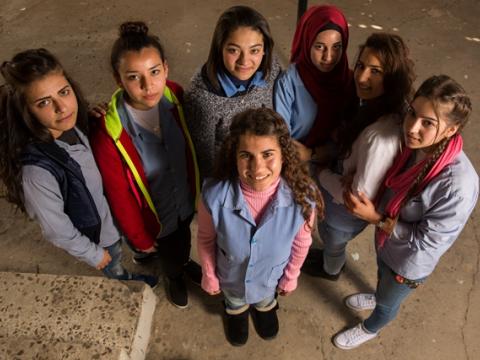Fearless, Confident, and Perseverant, Amar soon became the voice of her community

Amar Ismail is 16 years old and is best known for challenging “everything going wrong” in her community. She is the head of Children’s Committee in Akkar province, in northern Lebanon, as well as being a playwright and an aspiring lawyer who wants to defend children with no identification, who are often persecuted
In the little town of Tal Bire, Amar lives with her parents and seven siblings and goes to “El Hisa” High School, one of the few public schools in this province. A few years ago, she met a World Vision’s sponsorship officer who was reaching out to public schools and registering children who are interested in social activities. Her mother was there and showed interest and Amar became one of World Vision’s children.
Fearless, confident, and perseverant, Amar soon became the voice of her community, “I was very shy, I used to be afraid of voicing my opinion or what I think, it is only when I met World Vision and started taking part in their activities that I developed some confidence and I grew as a person,” Amar declares.
Amar has a lot to say about children in her community, from early marriage, to safe usage of internet to children with no identification. “I want to become a lawyer, to defend all those who are experiencing injustice in our community and believe me,they are a lot,” Amar says, adding: “The people I want to defend the most are children with no ID. It is the topic that means a lot to me.”
Amar has a neighbor, who has no identification but does have dreams to pursue his education. Unfortunately, this means he cannot enroll in any school or even get a job legally. “I know for a fact that his dreams are falling apart. Hehas big projects for his future, he wants to travel, to go to university and get a good job but he can’t,” she says., “Not having an ID is like being in prison. Itt is the biggest injustice a child can face.”
And well, this young woman speaks loudly and proudly about the importance of education in challenging the early marriage trend in her community, “Girls my age have the right to stay at school, early marriage is unfair for them, it is like a child raising a child, which is unjust for both the mother and the child, Amar explains. “Girls need to live their childhood and fulfill their dreams and education is a tool to face difficulties in life.”
But Amar didn’t have it easy. Sectarianism is heavily present in her community and draws boundaries between children, who sometimes are not allowed to mingle with each other, “Being Allouite Muslims, we were not allowed to mingle with Christians and Sunni Muslims because they looked different. The first one would wear short skirts and the second one the veil and neither of these appeal to people in my area,” Amar says. “Through our committee meeting in World Vision’s offices, we started meeting people from different backgrounds and breaking boundaries. This is when we built bridges and friendship and I got the idea for the play.”
Amar’s play is about sectarianism and the harm caused by segregation. It featured four actors, one Muslim Sunni, one Christian, one Allouite and a World Vision staff member (played by Amar). The performance was hosted by the municipality of Tal Bire and got many standing ovations.
Amar is now in her last year at school; she will be joining the faculty of law next and wants her voice to be heard. Her message is simple - children have the right to an ID, girls have the right to education, and sectarianism is toxic.